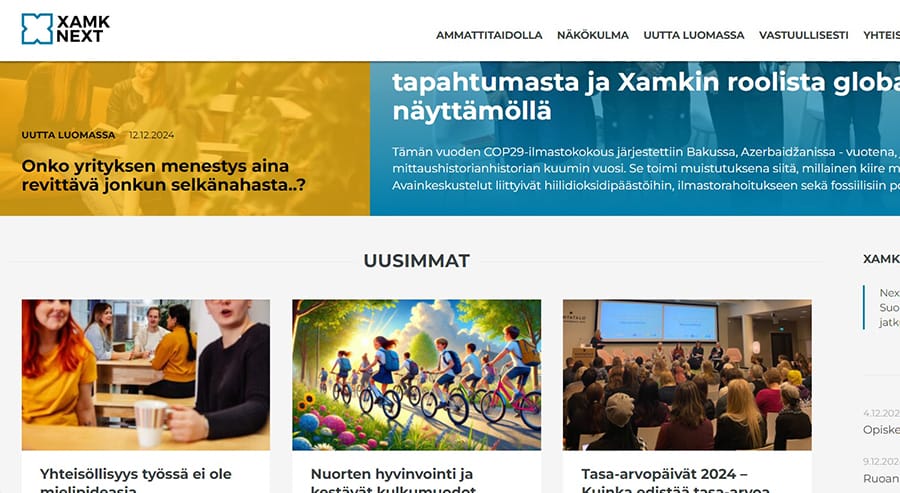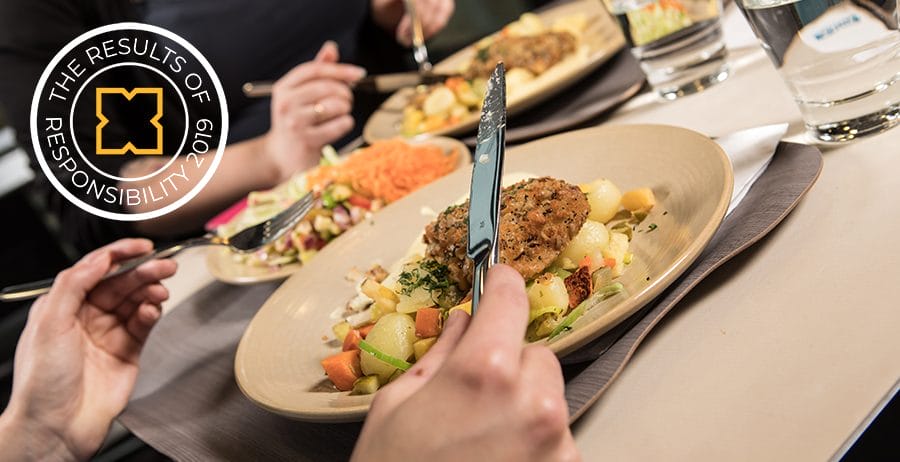The Swan label provides guidelines for Xamk restaurants
 Of the restaurants run by Xamk Restaurant Services, Talli, DeXi and Kasarmina in Mikkeli already have the Swan label. The Swan label, or the Nordic Ecolabel, guarantees that the restaurants comply with the principles of sustainable development and the life cycle model in environmental matters. The goal is that all Xamk restaurants meet the Swan label criteria by 2025.
Of the restaurants run by Xamk Restaurant Services, Talli, DeXi and Kasarmina in Mikkeli already have the Swan label. The Swan label, or the Nordic Ecolabel, guarantees that the restaurants comply with the principles of sustainable development and the life cycle model in environmental matters. The goal is that all Xamk restaurants meet the Swan label criteria by 2025.
Locally produced and organic Finnish food on the menu
Xamk restaurants use responsibly produced first-class ingredients. The choice of ingredients is based on factors such as Finnish origin, local production, traceability, safety, freshness, price, quality and security of supply. We require that the suppliers also make sustainable choices, and self-monitoring is documented electronically. According to the Swan label criteria, food produced or processed within 250 kilometres is specified as locally produced food. Nearly 70 per cent of all food products used by Xamk restaurants are Finnish.
The Xamk restaurants serve Finnish meat and dairy products. Only fish species approved by the WWF are allowed on the menu. Since autumn 2019, all the restaurants have at least one vegetarian dish on the menu every day. Bread comes mainly from local bakeries.
The Xamk restaurants also participate in the Portaat luomuun (‘Stairs to organic food’) programme. Depending on the restaurant, the number of organic products used ranges from 13 to 23. Altogether, the restaurants use about 30 different organic products.
Sustainability theme weeks on campuses
Applying the WWF Green Office environmental management system, Xamk aims to promote a vegetarian diet, find alternatives for dairy products and introduce an increasing number of food themes and events on campus. For instance, we participate in the annual national Climate-Friendly Week, the Heart Week, the Food Waste Week, the Organic Food Week and the Energy Saving Week.
During the Food Waste Week and Climate-Friendly Week, Xamk measures the amount of food waste. Food waste is also monitored at the annual level with the help of biowaste statistics. The amount of biowaste at Xamk restaurants decreased in 2019 as distance learning became more common.
Ecological everyday choices and guidance
At Xamk restaurants, we promote the staff’s environmental awareness with targeted training. We emphasise sustainability as a criterion in competitive tendering for professional kitchen equipment, napkins, printed matters and tableware. Over 90 per cent of the chemicals used for cleaning and dishwashing carry an ecolabel.
In addition to china dishes, Xamk restaurants use biodegradable disposable plates and cups. Customers get their coffee at a discount by using a KeepCup mug of their own or drinking their coffee from a china mug in the restaurant. In 2019, the purchases of biodegradable disposable plates and cups decreased by more than 30 per cent (measured in euros) compared with 2018.
Xamk restaurants favour batch cooking; that is, lunch is prepared in small batches throughout the lunchtime period instead of cooking one large batch in advance. Leftover food is sold at affordable prices for 15 minutes before the end of the lunchtime period. This helps to reduce food waste. In 2019, we also improved waste sorting instructions and customer guidance at Xamk restaurants, lobbies and conference rooms.
The Swan label covers energy consumption
The Swan label also requires taking energy consumption into account. With respect to lighting, Xamk restaurants are replacing old lamps with led-type solutions and implementing lighting control through motion detectors.
As regards energy consumption, the use of electricity decreased in 2019 in the DeXi and Kasarmina restaurants and increased in the Talli restaurant compared with 2018. Water consumption decreased in all these restaurants. Heat consumption increased, due to the cold winter 2018–2019.




